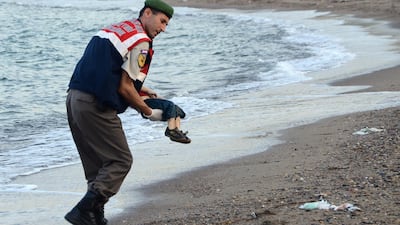There have been, over nearly eight years of war in Syria, certain images that stand out from a sea of snapshots capturing the devastating toll of the conflict. The Syrian war is one of the most well-documented conflicts of recent times and it would be too easy to become inured to the scale of suffering and loss, lost in the tide of pictures. But every now and again, a moment caught on camera reminds us of the individual heartbreak triggered by a war that has claimed half a million lives.
There was, in 2014, the Caesar cache, a stash of tens of thousands of photos smuggled out of the country by a military policeman tasked with photographing the bodies of numerous victims killed in Bashar Al Assad’s dungeons. The pictures of the wounded, the tortured and the murdered were identified by family members and drove home the true tyranny of Syria’s police state.
Then there was Aylan Kurdi, the three-year-old Syrian boy who tried to escape by sea; the haunting image of his body washed ashore three years ago encapsulated the cruelty of a world turning its back on refugees and initially sparked a huge surge in donations and promises of action. And there were the white shrouds of the children of Eastern Ghouta, hundreds of whom were suffocated to death by sarin gas in one of many chemical attacks on civilians.
The atrocities have been so numerous, the civilian casualties so widespread, that it is hard not to stumble on photographs of heartrending suffering, capturing the moment when lives and dreams are shattered and destroyed.
But there is one other factor that unites the three examples above: nothing happened as a result. Despite the cache of 55,000 photos demonstrating the brutality shown to regime prisoners, Mr Al Assad has yet to be charged with war crimes. Three years on from Aylan Kurdi’s drowning, Syrian children are still making potentially lethal crossings by sea, only now they are also from Lebanon; their future looks bleaker than ever. And despite talk from the international community of red lines being crossed, little action was taken after the chemical attacks, save for tokenistic airstrikes.
To those images we can now add one more: the picture, widely circulated on social media, of the body of Raed Fares, the Syrian activist and journalist known for his work running a radio station in the town of Kafranbel and crafting humorous posters in English condemning the failure of the world to stop the bloodbath in Syria, which went viral. There he was, having survived so many close calls, finally at rest. There were more hearts broken as the flame of the Syrian revolution flickered, battered by the storm winds from a dictator on one side and a cohort of militants on the other.
Fares once said of the Syrians killed in the conflict: “We are humans, not insects.” But the most heartbreaking thing to me, as I gazed upon that last image of him, was the knowledge that, while we might have an inkling who did it, the killers, like so many in Syria, will not face justice. Whoever gave the order or fired the missiles that killed Ghouta’s children, whoever starved the residents of Madaya and Aleppo, or bombed hospitals in Idlib, or beheaded civilians in Raqqa, or shot Fares, will probably never stand in a court of law.
As the regime of Mr Al Assad reclaimed vast swathes of Syria this year, land once filled with rebels in the early years of the conflict was back within his grasp. After surrendering, those rebels faced two choices – live in exile in Idlib, which will eventually suffer the same fate as other provinces, or stay and be “reconciled” with the government.
Tens of thousands chose not to abandon their homes and stayed in Ghouta and Daraa. Little is known of how they fare – how many have been detained and disappeared, or drafted into Mr Al Assad’s military, or simply left to live their lives.
Those areas have become black holes of information and networks of activists who once fed evidence of atrocities to UN investigators have steadily vanished with the advancing troops.
Rather than be held accountable for the violence, or face demands for scrutiny by the international community, Mr Al Assad will flex his ability to force a military solution on his foes. Nobody will therefore be answerable for the inhumane sieges in which children were starved to death or families were forced to live on cooked leaves and spiced water.
It is this profound impunity of the Assad regime and its backers that allowed it earlier this year to begin disclosing the deaths of thousands of arbitrarily detained individuals, who were arrested by the government’s security services between 2011 and 2014. The government began updating the civil registry entries of civilians whose cause of death was noted as “heart attack” or “heatstroke” while in detention. The UN’s Commission of Inquiry on Syria estimates that tens of thousands of people above the age of 15 have been randomly detained and disappeared by the regime in a systematic campaign to terrorise its own people.
Last week, the commission called on the Syrian regime to disclose the fates of detainees nationwide, saying there would be no peace in Syria without justice for the victims and their families. This is unlikely to give Mr Al Assad sleepless nights. The regime had so few qualms about its summary killing of detainees that it barely disguised their deaths with mass-produced medical certificates, caring little that by doing so it was tacitly acknowledging what really happened to those prisoners.
Fares once said: “Revolution is an idea and weapons cannot kill an idea.” Perhaps. But if you kill all hope of justice, all hope that the sacrifices made were worth it and the debts will be repaid – what then is left?


